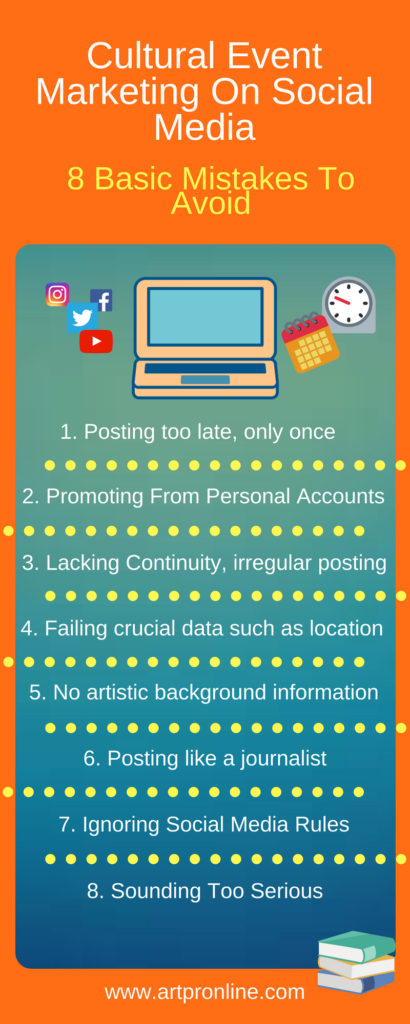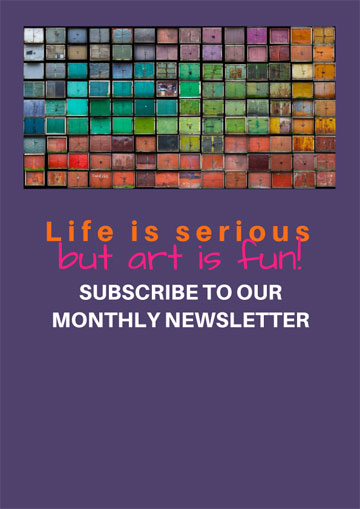Here Is How To Make Sure You Reach Everyone In Time
Did you ever miss a concert or an opening because you noticed it on the internet only when it was too late? It happened to me recently, and sadly I missed the recital of a favorite pianist although I happened to be nearby on that day. As a professional, I notice flaws in social media management of cultural organizations constantly. And after this incident, I decided to publish this blog post earlier than planned.
Cultural PR is a challenging job that requires a higher level of intellectual background. Being an experienced PR manager does not necessarily make one a good cultural PR strategist.
On the other hand, a successful cultural administrator is not necessarily a great marketing manager, either. For successful cultural promotion, you need to combine the two fields expertly.
In this article, we’re focusing on social media management only, as a means of cultural PR.

Cultural Event Promotion On Social Media: 8 Basic Mistakes To Avoid
- Posting Too Late
Every event, especially concerts and openings, must be announced in advance. And that, repeatedly. Even the most dedicated followers may skip a post if the announcement has been made only once.
The spontaneity of some social media platforms such as Twitter may work only if the event is in a small town and you can reach the location on foot.
Give your audience time, and make sure that they have seen your posts. - Promoting From Personal Accounts
The personal social media posts of the co-workers or artists contribute to the project promotion only if they function complementary to the main account. If the main social media structure is nonexistent, individual perspectives may bias the message you would like to give. Don’t let that happen. - Lacking Continuity
One of the most common mistakes of cultural marketers is failing to share posts regularly. After extreme frequent posting during art fairs and music festivals, the social media accounts are generally left to sleep for the rest of the year. This practice makes it extremely difficult to raise your visibility a year later.
Every social media account demands a minimum of continuity. Facebook may not show the posts of a “winter sleeper” account even to its followers. So it’s better to keep your social media accounts “alive” throughout the year. - Failing Crucial Data
Although it happens rarely, I have seen social media announcements failing to state the location or the time of an event. If it’s last minute emergency posting, or if the organizers assume that everybody is informed already, we just don’t know.
In any case, such announcements sound like a “See you later” note among friends, unprofessional and repellent. - Failing Background Information
What is the concept of your project? Who are the artists involved? The artistic background information must be shared in advance as a rule. Although the texts must be suitable to the rules of each medium, here is where you can allow longer posts. Failing to give the proper cultural information would be a pity as your precious work may go unnoticed by your audience and the press. - Working Like A Journalist Instead Of A Social Media Manager
Although a social media manager must be a competent communicator, try to resist the temptation to report on your own event. The idea is feeding the press with sufficient background information. Not taking over their job. One of the biggest advantages of social media is being able to inform the press directly. The rest is up to them. If your event is worth covering, you will get great publication.
Amateur journalism harms the PR campaigns. - Not Knowing About Social Media Rules
Every medium has its own rules. Some are quick flowing like Twitter, some are based on visuals like Instagram. Connecting several accounts to each other in order to save time, results in unsuitable posting. For instance, Instagram pictures don’t show up on Twitter, Facebook texts are cut short. Your posts must be prepared separately for each of your accounts. The frequency, the pictures, and the texts must be adapted accordingly. - Sounding Too Serious
Highly intellectual or not, remember that you are in entertainment business if you are a cultural entrepreneur. Cultural accounts must be fun to follow while being informative. Make sure that your posts are entertaining and attractive. Don’t be too serious to sound sophisticated. This may result in boring social media posts, sending your followers away.
So What Should Be Done?
I think it was Gary Vaynerchuck who said, “If you don’t exist on social media, you don’t exist. Period!” In any case, this is a new era with its new marketing rules. Therefore it’s best to accept the power of the internet as quickly as possible. There is no way around it.
So, if you are leading a short project or a small scale organization such as an art gallery with a few artists, take extra time to learn about cultural promotion on social media. Then plan additional time to put this knowledge into practice. Or get professional help.
If you are the intendant of a large-scale, complex cultural enterprise such as an art fair, music festival or a museum, make sure to rearrange your budget to hire a “web strategist”.
If you want to learn more about cultural PR on social media or if you need assistance please feel free to contact us.
What Is Your Personal Experience On This Subject?
Are you a cultural entrepreneur overwhelmed by the social media management?
Are you culturally interested and expect accessible information from the organizations?
Please share your insight with us on the box below.
Subscribe to our newsletter
Connect With Us On Social Media

